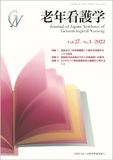Japanese
English
- 販売していません
- Abstract 文献概要
- 参考文献 Reference
抄録 本研究の目的は,終末期高齢がん患者のその人らしさを支える看護実践を明らかにすることである.
緩和ケア病棟看護師5人を対象に半構造化面接を行い,質的統合法(KJ法)で分析した.
終末期高齢がん患者のその人らしさを支える看護実践は,患者の言葉や姿といった【揺るがない側面への着目】を基盤とし,【患者が望む生活の実現に向けた調整】と並行して,【患者の力でやり抜く調整:生活環境を整える】と【患者の力でやり抜く調整:行動を見守る】の両面から行われていた.一方,患者の病状や老いの進行に伴い,患者が貫いてきたことがかなわなくなる局面では,それまでの【患者の力でやり抜く調整】から転じて,【看護の転換:他者の力を借りるという考えを後押しする】を行っていた.また,これまでの長い人生経験のなかで大事にしてきた患者の【価値観を受け止め,意をくむ】を行いつつ,看護師がとらえた【患者らしさを家族と共有する】ことによって,その人らしさを支えていた.がんや老いが進む状況においても終末期高齢がん患者の揺るがない側面に着目していくことで,その人らしさを支え続けることは可能であることが示唆された.
The objective of this study was to elucidate a method of nursing practice that puts emphasis on the individual personality of each elderly patient with terminal cancer.
Semi-structured interviews on nursing practices with five nurses working at a palliative care unit were conducted, and the results were analyzed with the qualitative synthesis method (KJ Method).
The nursing practices were based on [focusing on unwavering attitudes of patients], such as patients' words and behavior, and carried out by [adjusting nursing care to realize daily lives that patients desire] as well as by [adjusting nursing care to encourage patients to achieve something by themselves: helping to create better living conditions] and [adjusting nursing care to encourage patients to achieve something by themselves: watching over patients]. When patients became unable to accomplish things that could have been done before due to the progression of the disease condition and aging, the nursing practices changed from [adjusting nursing care to encourage patients to achieve something by themselves] to [transforming nursing care: encouraging patients to ask for help from others]. In addition, the nurses put emphasis on patients' individual personalities through [accepting patients' values and giving consideration to patients' intention], which have been cherished in patients' long life experience, and through [sharing patients' personalities with their family] that have been captured by the nurses.
This study suggests that through focusing on unwavering attitudes of patients, it is possible to keep supporting elderly patients with terminal cancer while giving consideration to patients' individual personalities even during the progression of cancer and in the process of aging.
Copyright © 2022, Japan Academy of Gerontological Nursing All rights reserved.


